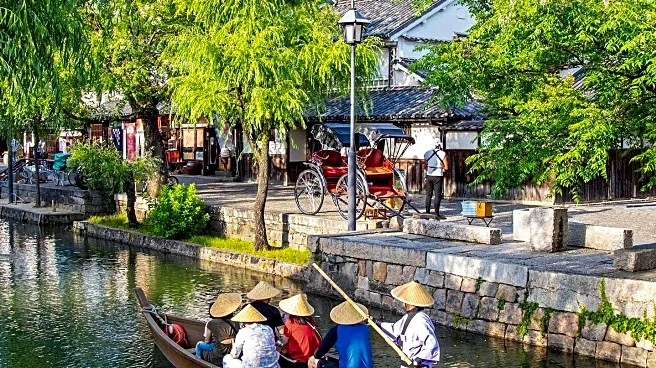What's Happening?
The Tiverton Canal Company, a family-run heritage attraction in Devon, is up for sale as its owners, Philip Brind and his wife, consider retirement after 40 years of operation. The business is one of only two horse-drawn barge attractions left in the UK. Mr. Brind expressed hope for a buyer who shares a passion for horses and boats, but if no buyer is found, the business may face liquidation. This would mark the first time in decades that the Grand Western Canal would be without such an attraction. The potential sale has raised concerns about the impact on local tourism and fringe businesses in Tiverton.
Why It's Important?
The sale of the Tiverton Canal Company could significantly impact local tourism and the economy in Tiverton. The horse-drawn barge is a key attraction that draws visitors to the area, benefiting nearby businesses. If the business is liquidated, it could lead to a decline in tourist visits, affecting local shops and services that rely on the influx of visitors. The situation highlights the challenges faced by heritage attractions in maintaining operations amid changing ownership and retirement plans. The potential loss of this unique attraction underscores the importance of preserving cultural and historical tourism sites.
What's Next?
If a buyer is not found, the Tiverton Canal Company may continue operations for a limited time before facing potential liquidation. Local stakeholders, including Councillor Steve Lodge, have expressed concern over the potential loss to the town's cultural heritage and economy. Efforts may be made to attract potential buyers who can sustain the business and preserve its historical significance. The community may also explore alternative solutions to maintain the attraction and support local tourism.
Beyond the Headlines
The potential sale and liquidation of the Tiverton Canal Company raise broader questions about the sustainability of heritage attractions in the UK. As owners retire, finding successors who can maintain the cultural and historical value of such businesses becomes crucial. This situation reflects a wider trend where traditional attractions face challenges in adapting to modern economic pressures and changing consumer interests. The preservation of historical sites and attractions is vital for cultural continuity and community identity.








